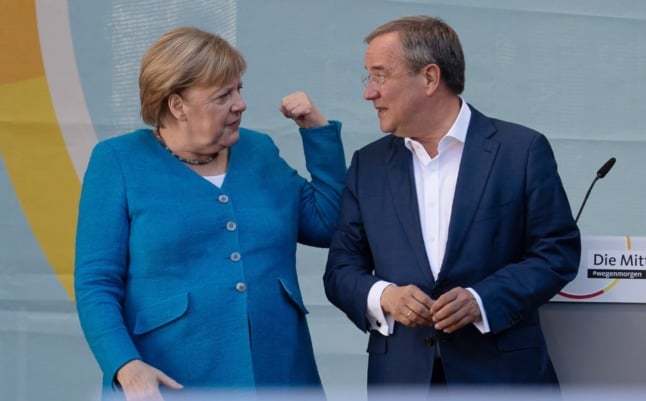The move sets up Söder, head of the regional CSU party, against Armin Laschet, the chief of Chancellor Angela Merkel’s CDU, in a contest to succeed the veteran leader — even as the centre-right alliance’s poll ratings plummet.
“If the CDU were willing to support me, I would be ready,” Söder said at a crunch meeting of conservative MPs, a source told AFP.
Long-time Merkel ally Laschet, 60, took over as CDU leader in January, and would normally be first choice to lead the CDU and its Bavarian affiliate CSU into the elections on September 26.
But the sister parties’ backing is tumbling over their recent handling of the coronavirus crisis, and some are calling for Laschet to step aside in favour of the more charismatic Söder, 54.
Söder spent months avoiding any clear show of interest in the top job — while doing little to dispel talk that he wants the chancellorship for himself.
READ MORE: Three-quarters of Germans think new CDU leader Laschet ‘not suitable choice for Chancellor’
Heading into the Sunday meeting, the Bild newspaper declared Sunday’s meeting “the weekend of truth” in the race to succeed Merkel.
“We have a great interest in the whole thing moving ahead quickly now,” CDU parliamentary leader Ralph Brinkhaus said before the talks began.
Popularity contest
In an interview with weekly Bild am Sonntag, Laschet also called for a quick decision given “the mood across the CDU”.
“Unity is very important. It would do the CDU and CSU a lot of good to make the decision together. And very promptly,” he said.
The candidate will most likely be picked behind closed doors, with Laschet telling broadcaster ZDF that the conservatives would choose whoever “best suited our election programme”.
Yet in an interview with Spiegel magazine on Wednesday, Söder insisted that the candidate needed to be “accepted by the whole population, not just the party”.
The Star Trek fan and fancy-dress loving Bavarian consistently beats Laschet in popularity polls, with a recent survey by public broadcaster ARD showing that 54 percent of Germans thought Söder would be a good candidate, compared to just 19 percent for Laschet.
As leaders of Germany’s biggest federal states by population and area respectively, North-Rhine Westphalia premier Laschet and Bavarian chief Söder have also exchanged blows over their leadership in the pandemic.
Laschet’s reputation as the reliable continuity candidate took a hit at the end of March, when Merkel criticised his state’s slowness to reimpose restrictions despite rising infection rates.
Söder jumped on the opportunity, praising Merkel’s handling of the pandemic and arguing that the Chancellor should help decide who would be her successor.
“A CDU/CSU candidate without the support of Angela Merkel will not be successful,” he told Bild last weekend.
Laschet praised Merkel on Sunday, telling Bild her “course and style have done the country good”, but also said a “new era is dawning” for the CDU/CSU.
The parties must learn from mistakes made in the pandemic and strive to “reduce bureaucracy, make decisions faster, drive forward the digital transformation of administration and the economy”, he said.
Green envy
While Laschet remains more likely to win over party bigwigs, Söder has also already drawn the support of several CDU lawmakers, as conservative MPs eye falling poll ratings with growing nervousness.
Trust in the CDU/CSU has been severely hit in recent months by a sluggish vaccination programme and a corruption scandal over mask procurement, leaving the conservatives at record lows of less than 30 percent.
With the once fringe Green Party now just a few points behind them, the CDU/CSU could face the real prospect of losing the chancellery for the first time since 2005.
READ MORE: New head of Merkel’s CDU under fire for pandemic comments



 Please whitelist us to continue reading.
Please whitelist us to continue reading.
Member comments